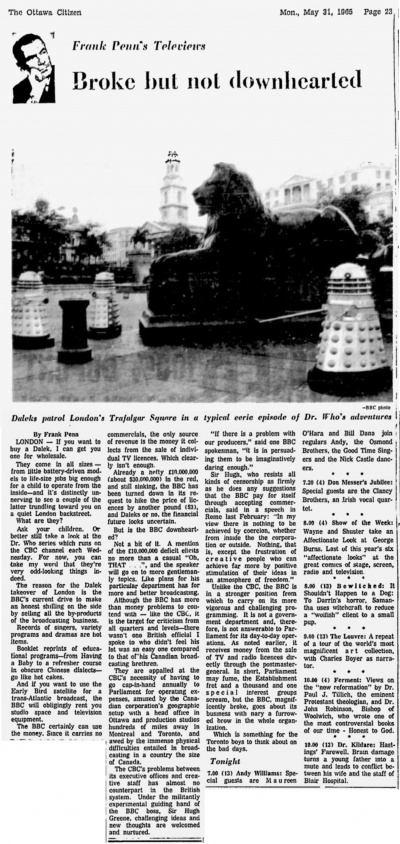Broke but not downhearted
- Publication: Ottawa Citizen
- Date: 1965-05-31
- Author: Frank Penn
- Page:
- Language: English
Daleks patrol London's Trafalgar Square in a typical eerie episode of Dr. Who's adventures
LONDON — If you want to buy a Dalek. I can get you one for wholesale.
They come in all sizes —from little battery-driven models to life-size jobs big enough for a child to operate from the inside—and It's distinctly unnerving to see a couple of the latter trundling toward you on a quiet London backstreet.
What are they?
Ask your children. Or better still take a look at the Dr. Who series which runs on the CBC channel each Wednesday. For now, you can take my word that they're very odd-looking things indeed.
The reason for the Dalek takeover of London is the BBC's current drive to make an honest shilling on the side by selling au the by-products of the broadcasting business.
Records of singers, variety programs and dramas are hot items.
Booklet reprints of educational programs—from Having a Baby to a refresher course in obscure Chinese dialects-go like hot cakes.
And if you want to use the Early Bird satellite for a trans-Atlantic broadcast, the BBC will obligingly rent you studio space and television equipment.
The BBC certainly can use the money. Since it carries no commercials, the only source of revenue is the money it collects from the sale of individual TV licences. Which clearly isn't enough.
Already a hefty Eln.000.000 (about S30.00.000) in the red, and still sinking, the BBC has been turned down in its request to hike the price of licences by another pound (S3), and Daleks or no. the financial future looks uncertain.
But Is the BBC downhearted?
Not a bit of it. A mention of the 810,000,000 deficit elicits no more than a casual "Oh. THAT .", and the speaker
will go on to more gentlemanly topics. Like plans for his particular department has for more and better broadcasting.
Although the BBC has more than money problems to contend with — like the CRC, it is the target for criticism from all quarters and levels--there wasn't ono British official I spoke to who didn't feel his lot was an easy one compared to that or his Canadian broadcasting brethren.
They are appalled at the CBC's necessity of having to go cap-in-hand annually to Parliament for operating expenses. amused by the Canadian corporation's geographic setup with a head office in Ottawa and production studios hundreds of miles away in Montreal and Toronto. and awed by the immense physical difficulties entailed in broadcasting in a country the size I of Canada.
The CBC's problems between its executive offices and creative staff has almost no I counterpart in the British system. Under the militantly experimental guiding hand of the BBC boss. Sir Hugh Greene, challenging ideas and new thoughts are welcomed and nurtured.
"If there Is a problem with our producers," said one BBC spokesman, "It is in persuading them to be Imaginatively daring enough."
Sir Hugh, who resists all kinds of censorship as firmly as he does any suggestions that the BBC pay for itself through accepting commercials, said in a speech ill Rome last February: "In my view there is nothing to be achieved by coercion, whether from inside the the corporation or outside. Nothing, that is. except the frustration of creative people who can achieve far more by positive stimulation of their ideas in an atmosphere of freedom."
Unlike the CBC, the BBC is in a stronger position from which to carry on its more vigorous and challenging programming. It is not a government department and, therefore, is not answerable to Parliament for its day-to-day operations. As noted earlier, it receives money from the sale of TV and radio licences directly through the postmaster-general. In short, Parliament may fume, the Establishment fret and a thousand and one special Interest groups scream, but the BBC. magnificently broke, goes about its business with nary a furrowed brow in the whole organization.
Which is something for the Toronto boys to think about on the bad days.
Disclaimer: These citations are created on-the-fly using primitive parsing techniques. You should double-check all citations. Send feedback to whovian@cuttingsarchive.org
- APA 6th ed.: Penn, Frank (1965-05-31). Broke but not downhearted. Ottawa Citizen .
- MLA 7th ed.: Penn, Frank. "Broke but not downhearted." Ottawa Citizen [add city] 1965-05-31. Print.
- Chicago 15th ed.: Penn, Frank. "Broke but not downhearted." Ottawa Citizen, edition, sec., 1965-05-31
- Turabian: Penn, Frank. "Broke but not downhearted." Ottawa Citizen, 1965-05-31, section, edition.
- Wikipedia (this article): <ref>{{cite news| title=Broke but not downhearted | url=http://cuttingsarchive.org/index.php/Broke_but_not_downhearted | work=Ottawa Citizen | pages= | date=1965-05-31 | via=Doctor Who Cuttings Archive | accessdate=9 February 2026 }}</ref>
- Wikipedia (this page): <ref>{{cite web | title=Broke but not downhearted | url=http://cuttingsarchive.org/index.php/Broke_but_not_downhearted | work=Doctor Who Cuttings Archive | accessdate=9 February 2026}}</ref>
